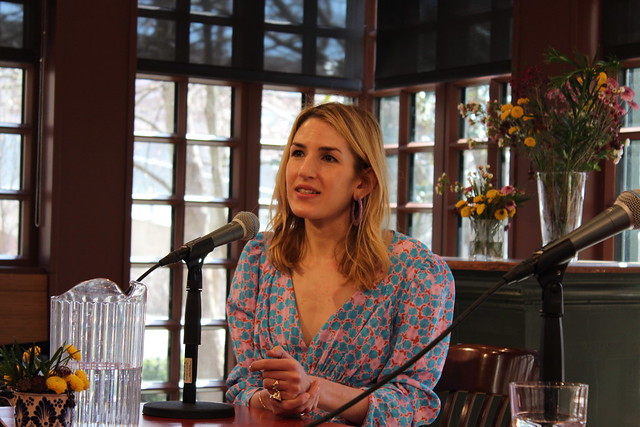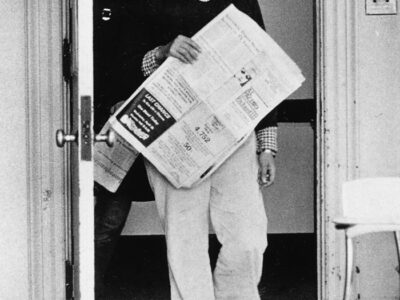
Penn alum discusses her unique path to writing about the president’s family.
Emily Jane Fox C’11 didn’t set out to psychoanalyze the first family. Hired by Vanity Fair in 2015 to write about “rich people,” as Fox characterizes her beat, she actually began her stint at the magazine with an aversion to politics. But “as luck would have it … a very rich man was running for president, and even though I studied politics in college and decided I didn’t want to cover them, I thought this was a weird enough way to do it,” Fox said at a lunchtime conversation at the Kelly Writers House in late March. And so, when she saw Ivanka Trump W’04 introduce her father Donald Trump W’68 before his June 2015 presidential announcement, she remembers thinking of Ivanka, “She’s a perfect Vanity Fair character.”
From there, the trajectory of Fox’s career was set into motion, as she went from a business feature reporter (she worked for CNNMoney from 2012 to 2015) to a chronicler of Ivanka Trump and the rest of the president’s inner circle. Last year, she wrote Born Trump: Inside America’s First Family—a detailed look at the president’s five children, as well as Jared Kushner, Ivanka’s husband and a White House advisor. Through her reporting, she developed a theory: each child represents a facet of their father’s persona. Ivanka is the “media mastermind,” Donald Trump Jr. W’00 is the “attack dog,” and Eric is “a real builder,” while Tiffany Trump C’16 and Baron “are sort of the real outsiders.”
If her shift into political journalism was unexpected, authoring this kind of book came as even more of a surprise to her. A month before the election, a literary agent emailed Fox with an idea for a book on the Trump family. At first, Fox ignored the pitch. “I didn’t email her because I thought these people were going to lose and no one was going to care about them a month from now. I’d had enough of covering them for the last two years, and I never wanted to write about them again,” Fox admitted. “And then, the day after the election I sent the literary agent a note that said, ‘I’m really sorry I ghosted you. Let’s do it.’”
And they did. One year and over 150 sources later, Born Trump was, well, born—a book that Entertainment Weekly described as “both entertaining and eye-opening” for its “never-before-heard stories on everything from the Trump kids’ college fraternity hijinks to a massive blowout fight on top of Aspen Mountain.”
One of the most important sources was Michael Cohen, Trump’s embattled former personal attorney, who on May 6 began a three-year prison sentence for, among other crimes, violating campaign finance laws related to hush-money payments to influence the 2016 presidential election. Before that, he proved invaluable to Fox, providing her with the general structure of the book by confirming her idea that the Trump children were “all mini Voltrons of Donald.” He also provided her with material for a lot more Vanity Fair articles along the way.
“As soon as I sat down with him to interview for the book, I had that same spidey sense I had when I saw Ivanka go down the escalator and I said to myself, ‘This guy’s going to be something. Something’s up with him, something is going to happen with him,’” Fox said. “It’s a good thing when you have your gut telling you something as a reporter, and it’s a good idea to follow that gut. I just kept calling him. I called him almost every day.”
On Valentine’s Day 2018, Fox happened to be in Cohen’s office when the president called him. Listening in to one side of the conversation, she deduced the call was “about some sort of public messaging around the Stormy Daniels affair.” Since, at the time Cohen claimed he paid Daniels out of his own pocket and volition, this proved a useful bit of news for Fox to report. It even followed Cohen to his congressional testimony over a year later when Cohen rebutted Trump’s claim that the president didn’t know about the hush money. “I was sitting in the front row of the testimony, and I thought I was going to faint because it’s a scary thing to have your story quoted in that setting with a million people watching,” she said. But Cohen confirmed that it happened and Fox was finally able to breathe—at least, a little.
“I think I’m very steeped in this world and these people—probably too steeped,” she said. “I spend a lot of time, obviously, talking with them and meeting with them, but also thinking about them. I think that to be a good reporter means to understand psychologically the people that you’re covering—in order to have a different level of coverage, you need to understand the motivation behind what they’re doing.”
With that understanding comes a level of humanity and empathy that Fox injects into her work. While she admits that the Trump administration often feels like “a weird reality show,” teeming with characters “well aware that they’re playing parts,” she simply wants her readers “to have some sort of emotional reaction to the things [she] writes.”
“Even if you disagree with everything they do,” she said, “the Trumps are people”—people who, despite overwhelming privilege, dealt with challenges growing up. “If you understand the family dynamic, you understand everything that’s playing out in the White House today,” she added. “If you understand that when Ivanka was nine years old, her father left her mother for a younger woman and she asked her mother at the time, ‘Is my last name still going to be Trump? Is dad still going to love me?’ then you understand that she does everything to please her father. She would never cross him, and she lives with this fear that’s held her entire life that her dad is going to abandon her.”
While reporting on the Trumps has been more rewarding than she ever thought, Fox looks forward to a time when she, and the rest of America, can talk about more. In a post-Trump universe, “if there ever is one,” Fox wants to return to what she originally set out to do: tell stories.
“I think what I’ve learned in this process is that I’m good at spotting the characters. I’m good at understanding how to get in there with those characters who I want to cover,” she said. “And I think that will translate into whatever happens next, whether I continue to cover politics or I want to go back to business reporting or whether I want to write another book. It’s all about storytelling and finding new people who light you up … so wherever the story is that will interest me next is wherever I will go.”
—Beatrice Forman C’22




